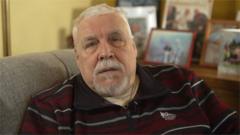3 hours ago
About sharing
A veteran who was sacked from the Navy for his sexuality says he fears he will die before he gets compensation from the UK government.
Joe Ousalice was one of thousands who were affected by a ban on LGBT people serving in the British military.
Last year the prime minister said the ban, which lasted until 2000, was an “appalling failure”, and those affected have been promised compensation.
Mr Ousalice, 73, says he now has cancer and is yet to receive any money.
An independent review, published last year alongside Prime Minister Rishi Sunak’s apology, suggested 49 ways the government could make reparations to those affected – including an “appropriate financial reward” capped at £50m overall.
A government spokesperson said it has already delivered on more than half of the recommendations and is working “at pace” to deliver those that remain.
Details of how compensation will be paid and how much each person will be entitled to are yet to be released.
Joe Ousalice, from St Helens, Merseyside, was a radio operator in the Navy from 1976 until 1993 and fought in the Falklands war.
During his almost 18 years of service he was investigated as a “suspected homosexual” around nine times. He was eventually dismissed because a court martial ruled his sexuality was “prejudicial to good order and naval discipline”.
He believes his bosses found out about his sexuality after he told a padre – a chaplain in the armed forces – that he was bisexual.
Although bisexuality was never explicitly outlawed, those who were bisexual were treated as though they were gay.
Had Mr Ousalice completed his 22-year contract, he would have immediately been able to claim a pension of at least £500 a month.
But his dismissal meant he was not eligible to claim it until he reached retirement age, which left him without an income.
Mr Ousalice said: “I was willing to give my life to them, but it was all just taken away from me.
“We class our armed forces as our heroes. Is this how the government treats their heroes?”
He says his home was repossessed, his debts mounted and on several occasions he stole food to survive.
Mr Ousalice believes he would have received more than £100,000 in pension payments by now if he had not been dismissed. He says the £50m promised by the government is “not enough” to cover everyone affected.
In the years after his dismissal, Mr Ousalice joined campaign group, Rank Outsiders, helping hundreds of others in situations like his with advice, benefits applications and legal aid.
Although each investigation into his own sexuality has left him with memories he says he will “never forget”, Mr Ousalice says his work supporting others has helped him to heal.
Many of the veterans affected by the ban are now elderly or facing medical problems.
Mr Ousalice was diagnosed with prostate cancer 18 months ago, which has now spread to his chest and doctors believe it has spread to his brain.
He fears he does not have enough time left to get any compensation for his dismissal.
“I want to get that compensation and see [this campaign] through to the end,” he says.
“It’s sort of the last battle I’ve got and it’s with the Ministry of Defence.”
Craig Jones, executive chairman of campaign group Fighting with Pride, said it was important the government act fast for veterans like Mr Ousalice.
He said: “Time is running out for many of those who are sick, old and impoverished.
“Fighting With Pride made detailed proposals for a financial compensation scheme in 2020 and provided further advice in August last year – however, [the government] seem no nearer to entering into meaningful discussions.
“The government must now move quickly to deliver proper recompense to all those affected by this hateful policy.”
A government spokesperson said they would provide more information about compensation “as soon as they can” and encouraged LGBT veterans to apply for restorative measures through the government’s support pages.
For civilians, the process of decriminalisation of homosexuality in the UK began in 1967 – but a ban continued in the armed forces until the year 2000.
The Etherton Report – officially known as the LGBT Veterans Independent Review – was led by Britain’s first openly gay judge, Lord Etherton.
It began in 2022 and heard about the experiences of more than 1,100 veterans between 1967 and 2000.
The report described an “incomprehensible policy of homophobic bigotry” and uncovered accounts of homophobia, sexual assaults, blackmail, “disgraceful” medical examinations and conversion therapy.
It made 49 recommendations to the government including:
Affected veterans to be given an “appropriate financial reward” capped at £50m overall
The restoration of medals that had to be handed back on dismissal or discharge
The clarification of pension rights
The presentation of a special veterans’ badge.
The government accepted all recommendations in principle and promised a full debate in parliament, although a date has not yet been set.
Related Topics
19 January 2022
20 July 2023
